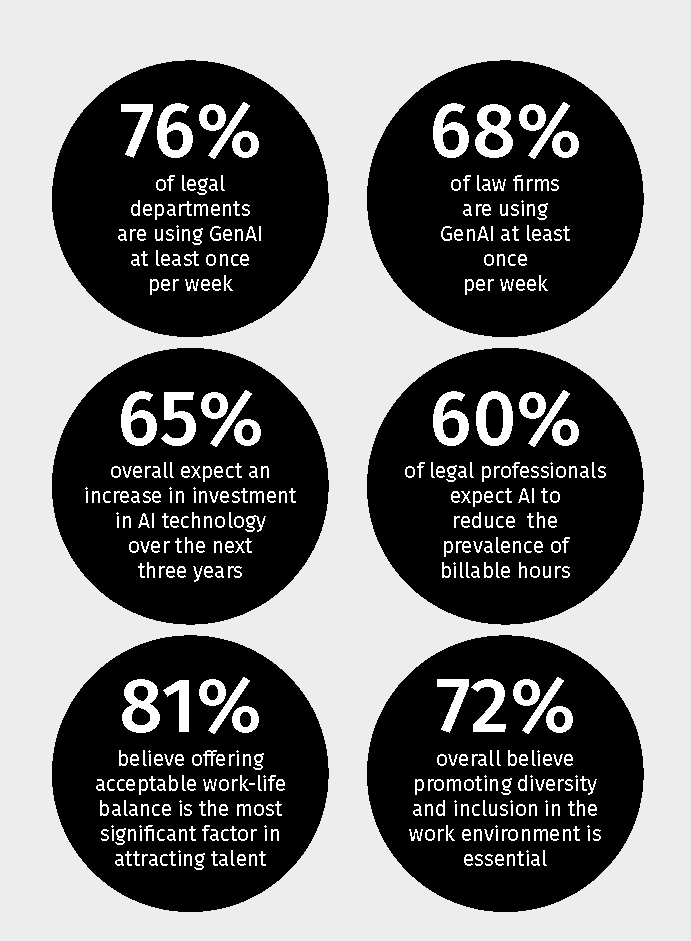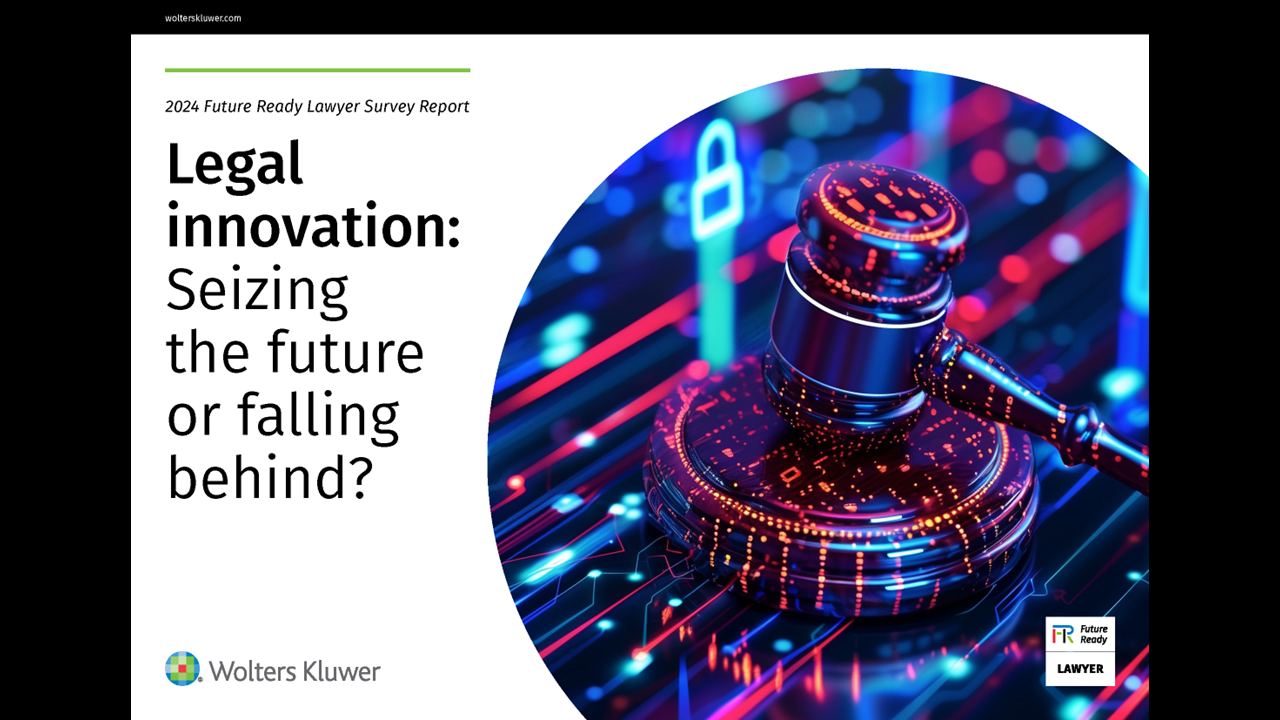Seventy-six percent of legal professionals in corporate legal departments and 68% in law firms are using generative AI at least once a week, with a third of those professionals using it daily.
That is among the findings of the 2024 Future Ready Lawyer Survey from Wolters Kluwer, the sixth edition of a report that offers an annual view of the legal industry’s evolving landscape, with a particular emphasis on technology, especially generative AI, and how these advancements are reshaping law firms and corporate legal departments.
Based on responses from 712 legal professionals in 10 countries, the report outlines significant trends, challenges, and opportunities the industry is facing over the next three years. These include technology integration, evolving client expectations, talent management, environmental, social, and governance (ESG) considerations, and information security.
Gen AI Adoption
Not surprisingly, the report finds that the integration of gen AI is one of the most significant trends in the legal industry, offering the potential to streamline processes, improve efficiency, and reduce manual tasks.
 Increasingly, the legal industry is adopting gen AI to handle routine legal processes, such as legal research, document review, and drafting. This shift allows legal professionals to focus on more complex, value-added tasks, the report says.
Increasingly, the legal industry is adopting gen AI to handle routine legal processes, such as legal research, document review, and drafting. This shift allows legal professionals to focus on more complex, value-added tasks, the report says.
According to the report, 76% of legal professionals in corporate legal departments use gen AI at least once a week, compared to 68% of those in law firms. A third of respondents use it daily. In addition, 65% of legal professionals expect AI technology investment to increase over the next three years.
But despite all the enthusiasm around gen AI, many challenges remain, the report says. Among the challenges most frequently cited by respondents were issues related to integration, trust in AI-generated outcomes, and concerns over ethics and data privacy.
Integrating gen AI into existing legal systems and workflows remains difficult, the survey says, with 37% of respondents in law firms and 42% in corporate legal departments citing this as a significant challenge.
Two other major issues are concerns over the accuracy of gen AI outputs and the ethical implications of using AI in legal work. Around 41% of law firm professionals and 37% of corporate legal professionals expressed doubts about the reliability of gen AI results.
Despite these challenges, the report underscores that gen AI is no longer an optional tool but a necessary component for future-ready legal organizations. To fully leverage the benefits of gen AI, legal professionals will need ongoing training, ethical guidelines, and robust review processes to mitigate issues like AI “hallucinations.”
AI’s Impact on the Billable Hour
Gen AI’s ability to drive efficiency is expected to have a profound impact on traditional legal business models, particularly the reliance on billable hours, the report concludes.
The reliance on billable hours, once a staple of the legal profession, is expected to decline as law firms adopt new pricing models, such as flat fees and value-based billing.
It finds that, overall, 60% of legal professionals expect AI to reduce the dominance of the billable hour model, with 67% of corporate legal departments and 55% of law firms believing that AI-driven efficiencies will significantly impact the prevalence of the billable hour.
More than half of the respondents feel prepared to adapt their business practices, workflows, and pricing models to accommodate these changes.
Attracting and Retaining Talent
On another topic, the report finds at attracting and retaining top legal talent remains a challenge in an industry undergoing transformation.
In particular, legal professionals emphasized the value of work-life balance, competitive compensation, and opportunities for continuous learning.
The report says that 81% of respondents emphasized the importance of work-life balance, and 82% believed their organization performed well in this area.
And, in an age when AI is becoming more integrated into legal work, 72% of respondents stated that technological proficiency is increasingly essential when hiring new talent.
ESG Issues
There continues to be growing demand for expertise in environmental, social, and governance (ESG) issues, and that demand is putting pressure on both corporate legal departments and law firms, the survey finds.
That said, corporate legal departments feel better prepared to address ESG demands than law firms, with 41% of corporate respondents feeling “very prepared” compared to only 29% of law firm respondents.
However, both sectors face challenges, particularly in terms of training staff and aligning with regulatory changes.
While the need for ESG training is clear, the report says, less than half of law firms currently offer such programs. Among corporate legal departments, 56% offer ESG training.
The report cautions that, as ESG-related demands grow, firms that fail to adapt may struggle to meet client expectations.
The Challenge of Information Security
Another challenge faced by respondents in the survey is information security. With the rise of cyberattacks and data breaches, 74% of legal professionals see escalating information security challenges as a major trend, with 33% expecting a significant impact on their organization.
However, only 29% of respondents feel “very prepared” to meet these security challenges, despite 80% believing that their organization is generally prepared. This gap between general readiness and complete preparedness underscores the need for ongoing improvements in information security practices.
“The question of whether legal professionals are future-ready remains relevant and compelling, even after six years of Future Ready Lawyer research,” the report concludes.
Clearly that is so, as the survey paints a picture of an industry in the midst of profound transformation, due most strikingly to the rapid proliferation of gen AI, a development, the report says, that has put lawyers to the test.
“Judging from the 2024 Future Ready Lawyer Survey results, they seem to have jumped on the gen AI train more rapidly than they’ve ever jumped on new technology before. It is a promising development, which says a lot about the agility and adaptability of legal professionals.”
 Robert Ambrogi Blog
Robert Ambrogi Blog